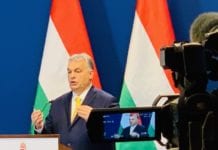By Stefan J. Bos, Chief International Correspondent BosNewsLife reporting from Budapest, Hungary

BUDAPEST, HUNGARY (BosNewsLife)– Mental patients who fled the war in Bosnia-Herzegovina in the 1990s have returned home after years in a refugee facility in Hungary.
Officials say the patients were the last known Bosnian refugees on the territory of Hungary, which accommodated tens of thousands of people fleeing Europe’s bloodiest conflict since World War Two. It comes as a Bosnian Serb war crimes suspect received a long prison term for his role in the Balkan war.
The Ambassador of Bosnia-Herzegovina in Hungary, Nikola Djukic, confirmed to BosNewsLife Saturday, October 17, that 19 Bosnian refugees under mental care returned to their homeland, some 17 long years after they fled the Balkan war.
Djukic said the mainly elderly men and women were spending their first weekend at a medical center in the village of Jakes, on the outskirts of the Bosnian city of Modrica.
SPECIAL CONVOY
He explained that the convoy that transported refugees left from the refugee facility Thursday was arranged by Hungarian authorities. “They drove them in the bus [and] there was also an ambulance from them. A medical team from Jakes arrived to be with them during the transport. And also from the Hungarian side, the [Office] of Immigration and Nationality, provided a medical team that also travelled with them and they will stay in Jakes for 10 days,” he said.
The diplomat described the homecoming as “the end of a long and heart broken chapter” for the refugees from Bosnia-Herzegovina on foreign soil.
Hungary accommodated about 60,000 refugees from Bosnia-Herzegovina and other states that were once part of Yugoslavia, before the federation’s bloody disintegration in the 1990s.
The refugees who returned this week were part of a group of about 75 patients in need of mental treatment. All were rushed away from a medical facility during the war, in what is now the Serbian entity of Bosnia-Herzegovina.
While about half of them returned home in 2002, the remaining group awaited their moment at a refugee facility in the Hungarian eastern city of Debrecen.
REFUGEES DIED
Ambassador Djukic said sixteen of those waiting in Hungary died, although heclaimed this was due to old age and sickness. He admits it took the Bosnian authorities a long time before accepting the remaining refugees.
“You have to know that Bosnia- Herzegovina had right after the war some 1 million people refugees and 1.5 million internally displaced.So almost one-half of the population was moved from their pre-war or places of their origin. So it was really not easy at all to provide additional accommodation,” he said.
Ambassador Djukic acknowledged that the refugees have returned to a divided country that is still dealing with the wounds of war and the prosecution of those involved in crimes.
On Friday, Bosnia-Herzegovina’s war crimes court sentenced a former Serb officer, Milorad Trbic, to 30 years in jail for killing dozens of people in 1995 in the Bosnian town of Srebrenica. In total, investigators say, some 8,000 Muslim men and boys were murdered in Srebrenica by Bosnian Serb forces.
KARADZIC TRIAL
The perceived architect of Europe’s worst massacre since the Second World War, former Bosnian Serb leader Radovan Karadzic has asked the United Nations Security Council to pass a resolution exempting him from trial at the U.N. War Crimes Tribunal for the former Yugoslavia.
He claims in a letter that former U.S. special envoy to the conflict in Bosnia-Herzegovina, Richard Holbrooke offered him in 1996 to leave politics in exchange for immunity from prosecution. Holbrooke has repeatedly denied the deal.
Karadzic, who was arrested in Belgrade last year is due to go on trial later on October 26 on 11 charges, including two counts of genocide relating to the three-year Bosnian conflict, which ended in 1995.
Despite ongoing trials and ongoing ethnic tensions, the Bosnian Foreign Minister Sven Alkalaj has BosNewsLife in Budapest that he believes that Bosnia-Herzegovina will eventually be able to join NATO within three years and the European Union.
”Bosnia-Heregovina will be a member of EU and NATO as one country…Because it has its advantage. It is a multicultural, multi-religious country where people for centuries lived together, and this is an asset which Europe should not undermine,” he said.
For now though, Bosnia-Herzegovina remains divided between a Serb entity and a Muslim-Croat federation where officials say many people need mental care to overcome the horrors of their recent history. (Parts of this BosNewsLife News story also airs via the Voice of America(VOA) network. (https://www.voanews.com/english/2009-10-17-voa33.cfm )








